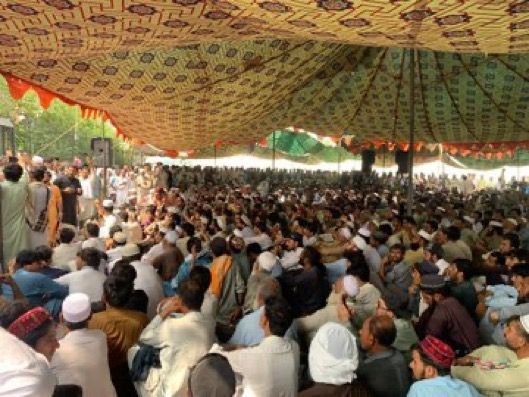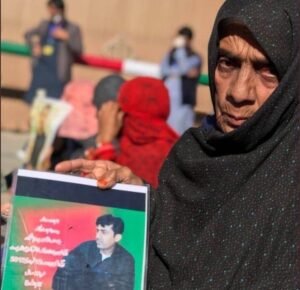Crisis in Khyber-Pakhtunkhwa: Military Violence and the Fight for Human Rights

Photo from @Manzoor Pashteen X account
By Shinwari
In the tumultuous region of northwest Pakistan, recent events have underscored the volatile interplay between militant activities and government crackdowns. The Bannu district of Khyber-Pakhtunkhwa Province has become a focal point of unrest, as thousands of demonstrators stage a sit-in protest following allegations of military violence against a peace march on July 19.
The peace march in Bannu, intended to draw attention to the surge in militant attacks in the region, ended in tragedy when the Pakistani army fired on the participants. Reports from local leaders indicate that the attack resulted in one death and 27 injuries, with the victims taken to Bannu district hospital. The military has yet to comment on their actions.
In response to the incident, the provincial government has imposed a mobile and internet blackout in Bannu and formed an investigative commission to probe the matter. Nasir Bangash, a leader of the sit-in protest, has vowed to continue the demonstration until the government can assure peace in the province.
Human rights organizations have been vocal in their condemnation of the violence. Amnesty International criticized the use of lethal force at a peaceful rally, calling it unlawful and demanding a prompt investigation to hold accountable those responsible for the attack. The organization also criticized the communication restrictions, stating that they hinder the public’s ability to mobilize and contribute to misinformation and panic during emergencies.
The Human Rights Commission of Pakistan (HRCP) echoed these sentiments, describing the incident as a state-sanctioned violation of citizens’ rights to life and peaceful assembly. The HRCP’s statement highlighted a dangerous disregard for citizen-led calls for peace.
The violence in Bannu has triggered protests across Khyber-Pakhtunkhwa, including the regional capital, Peshawar. Pashtun nationalist political parties and the provincial assembly have condemned the violence against peaceful protesters. The region, plagued by an increase in militant attacks over the past two years, primarily attributed by Pakistani establishment to groups such as Tehrik-e Taliban Pakistan (TTP) and their affiliates, is on edge.
The resurgence of militant activities has led to a series of deadly incidents, putting immense pressure on the Pakistani military and security forces. On July 15, a militant attack killed eight Pakistani soldiers when an explosive-laden vehicle rammed into a garrison in Bannu. The military has conducted targeted operations against militants in various parts of the province but has yet to quell the rising tide of violence, possibly because as most of these operations have resulted in death of innocent people including women and children.
Residents of Khyber-Pakhtunkhwa have expressed frustration with Islamabad’s perceived inadequacy in providing security, while also fearing the potential fallout of a large-scale military operation. The precarious situation leaves the population caught between the threats posed by militant groups and the heavy-handed tactics of the government.
The unrest in Khyber-Pakhtunkhwa is further compounded by a series of attacks targeting journalists, highlighting the pervasive threat to press freedom in the region. Hassan Zeb, a reporter for the Peshawar-based Aaj newspaper, was killed on July 14 by unidentified gunmen in Nowshera. Zeb’s death marks the third journalist killed in the province in recent months, bringing the total to eight journalists killed in Pakistan in 2024 alone.
These attacks have drawn condemnation from international journalist organizations like the International Federation of Journalists (IFJ) and the Pakistan Federal Union of Journalists (PFUJ), which have called on the government to protect media workers amidst rampant violence and impunity. Journalists in the region face threats not only from militant groups but also from state actors, severely hampering their ability to work independently and report freely.
The escalating violence in northwest Pakistan reflects a complex and dangerous environment where militant attacks and government crackdowns create a cycle of fear and unrest. The recent incidents in Bannu and the targeting of journalists underscore the urgent need for a comprehensive approach to restore peace and protect human rights in the region. Pakistani establishment appears to have turned a blind eye towards the miseries of the common people in the region. As protests continue and international pressure mounts, the world watches closely, hoping for a resolution that prioritizes peace and justice.
Author chooses a single pseudonym. Shinwari is a freelance journalist based in Peshawar, Pakistan.
Note: The contents of the article are of sole responsibility of the author. Afghan Diaspora Network will not be responsible for any inaccurate or incorrect statement in the articles.











